|
|
|
Sort Order |
|
|
|
Items / Page
|
|
|
|
|
|
|
| Srl | Item |
| 1 |
ID:
107608


|
|
|
|
|
| Publication |
2011.
|
| Summary/Abstract |
Terrorism, and particularly its militant Salafist form, remains an oft-discussed but often poorly understood phenomenon. There is an ever-expanding body of literature on militant Salafism in the West. A great deal of this offers some manner of alienation as an explanation as to why a path of militancy was pursued. This article explores what explanatory value alienation is felt to offer such accounts. It then considers some of the considerable problems that face these claims, difficulties that seriously undermine the usefulness of alienation as a concept that helps us to understand militancy.
|
|
|
|
|
|
|
|
|
|
|
|
|
|
|
|
| 2 |
ID:
107609
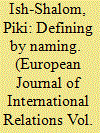

|
|
|
|
|
| Publication |
2011.
|
| Summary/Abstract |
Politics is a public effort directed at the allocation of resources, both material and symbolic. Quite often it involves conflict in the form of a public struggle over the allocation of resources. Informed by Antonio Gramsci's theory of hegemony, this article offers a political reading of constructivism (a theoretical perspective here called Political Constructivism). It maintains that politics is guided by a conscious effort by political agents to control the commonsensical understanding of social reality using the media of political concepts, metaphors, symbols, and - the focus of this article - names and definitions. Political agents regard controlling the commonsense as one of the most effective political tools. They understand that it can be controlled by attaching meanings to political concepts, by linking metaphors and symbols to ideas, and by linking events to classes of events through naming and defining. This article examines the civic warring in Israel over the defining and naming of the Second Lebanon War as a case in point. Defining and naming the event involved a political struggle to frame the commonsense, gain the upper hand in the political process of constructing socio-political reality, and reap the political gains. The article argues that the political struggle was resolved by what I call a weak Kripkean-like defining, in other words, defining by naming.
|
|
|
|
|
|
|
|
|
|
|
|
|
|
|
|
| 3 |
ID:
107605
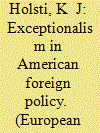

|
|
|
|
|
| Publication |
2011.
|
| Summary/Abstract |
This article argues that exceptionalism is a type of foreign policy not exclusive to the United States. It examines other historical cases, including post-Revolutionary France and the Soviet Union. The three cases are comparable in terms of their main characteristics, which include claims of exemptions from the ordinary rules of international relations, messianic missions to 'liberate' others, and perceptions of universalized threats. The article also explores the historical and normative foundations of exceptionalist foreign policy claims and practices. All three cases demonstrate the assumptions of social and political superiority that underlie these normative bases. The article concludes with some observations about the incompatibility of exceptionalist foreign policies with the Westphalian foundations of the international order.
|
|
|
|
|
|
|
|
|
|
|
|
|
|
|
|
| 4 |
ID:
107611
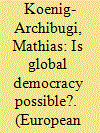

|
|
|
|
|
| Publication |
2011.
|
| Summary/Abstract |
Scepticism about the possibility of a democratically governed global polity is often rooted in beliefs about 'necessary conditions'. Some democracy scholars consider a transition to global democracy to be incompatible with necessary conditions for democratic governance, while some International Relations scholars consider it to be incompatible with necessary conditions for international structural change. This article assesses hypotheses and evidence about democratic transitions within states and transformations in the interaction among states and concludes that arguments based on necessary conditions are not compelling. This suggests that global democracy may be unlikely but it is not impossible.
|
|
|
|
|
|
|
|
|
|
|
|
|
|
|
|
| 5 |
ID:
107607
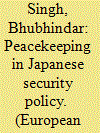

|
|
|
|
|
| Publication |
2011.
|
| Summary/Abstract |
This article analyses how peacekeeping became available to Japan as a policy option during the early 1990s and, thereafter, a part of the national security discourse through the international-domestic contexts interaction approach. The international context refers to the nature (culture) of the international environment at a particular period of time defined by the dominant norms that govern inter-state relations. It also highlights the policy options available to states. The domestic context refers to the nature of the leadership within a state that interprets the international norms and incorporates them into the domestic agenda. Japan's implementation of the peacekeeping policy was a result of the collective security norms that defined the international environment during the early 1990s and the re-emergence of the revisionists within the Japanese political system - a group that embraced the collective security norms and pushed for the peacekeeping policy in the hope of expanding Japanese security policy in the post-Cold War period.
|
|
|
|
|
|
|
|
|
|
|
|
|
|
|
|
| 6 |
ID:
107610


|
|
|
|
|
| Publication |
2011.
|
| Summary/Abstract |
This article analyses the World Trade Organization within a principal-agent framework. The concept of complex agent is introduced to focus on the variety of actors that comprise an international organization. Special attention is paid to the relationship between contracting parties' representatives and the Secretariat. In the empirical part, the article analyses the role of the Secretariat in assisting negotiations and presents evidence of declining influence. It is shown how principal-agent theory can contribute to addressing this puzzle of 'missing delegation'. The article concludes with a cautionary note as to the 'location' of international organizations' emerging pathologies and calls for additional research to address the relationship between material and social sources to explain behaviour of the key actors within the complex agency.
|
|
|
|
|
|
|
|
|
|
|
|
|
|
|
|
| 7 |
ID:
107613
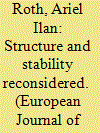

|
|
|
|
|
| Publication |
2011.
|
| Summary/Abstract |
The argument that multipolar international systems are less stable because certain states have an incentive to externalize the costs of defense to other states has been built on interpretations of the behavior of France, Russia, and especially Great Britain between the two World Wars. This article addresses flaws in both the use of the French and Russian cases, but is most tightly focused on the British case, which was the strongest, prima facie, of the three. This article demonstrates how the British scheme for defense against Germany was not a policy of attempted externalization on either the political or military level. Consequently, the long debate over the relationship between systemic structure and systemic stability, which has been heavily influenced by the belief in the existence of an incentive to externalize defense costs under multipolarity, must be re-examined, with new tests run and new conclusions explored.
|
|
|
|
|
|
|
|
|
|
|
|
|
|
|
|
| 8 |
ID:
107612
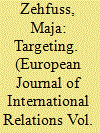

|
|
|
|
|
| Publication |
2011.
|
| Summary/Abstract |
War necessarily involves destruction. The development of precision-guided munitions seems to have made it possible to produce intended damage with increasing efficiency and to reduce 'collateral' damage. This has given rise to the expectation that fighting with such weapons reduces the extent of destruction and, crucially, that it is therefore becoming increasingly possible to protect non-combatants during war. This article examines this idea by exploring in some detail what is meant by 'precision' and asking how far this actually entails protection for non-combatants. The article shows how praise for precision not only produces Western warfare as ethical but also both relies upon and reproduces a particular kind of ethics, based on the notion of non-combatant protection. The conclusion draws together the implications of the faith in precision for how we think about war and challenges the underlying assumption that more precision is better.
|
|
|
|
|
|
|
|
|
|
|
|
|
|
|
|
| 9 |
ID:
107606


|
|
|
|
|
| Publication |
2011.
|
| Summary/Abstract |
The paradigmatic case in which an almost permanent impasse exists in coming to terms with a difficult war past and 'normalizing' its international relations is that of Japan. Although successive Japanese governments have apologized over the last few decades, these have been countered by periodic episodes within Japan revolving largely around history textbooks, the remembrance of war dead and the quest by nationalists to restore national pride in the past. Regional relations were especially strained during the premiership of Koizumi Juni'chirô and his immediate successor, Abe Shinzô. They improved under Fukuda Yasuo, a moderate on war memory issues, and remained steady under Asô Tarô. Japan's latest prime minister, Hatoyama Yukio, appears determined to address Japan's war past more openly and critically than previous LDP figures, no doubt with an eye to improving Japan's relations with its Asian neighbours. But whatever line he pursues, contestation over war memories will remain an issue. They are driven by deep divisions within Japan at the same time that political leaders seek a more prominent identity for Japan as a 'normal' actor in international affairs. This article analyses key aspects of the politics of Japan's war memories, using insights from collective memory studies and constructivist IR theory. We suggest that the quest for 'normality' has generated a set of tensions and contradictions over the issue of war memories, both domestically and internationally, for which there is no resolution in sight.
|
|
|
|
|
|
|
|
|
|
|
|
|
|
|
|
|
|
|
|
|